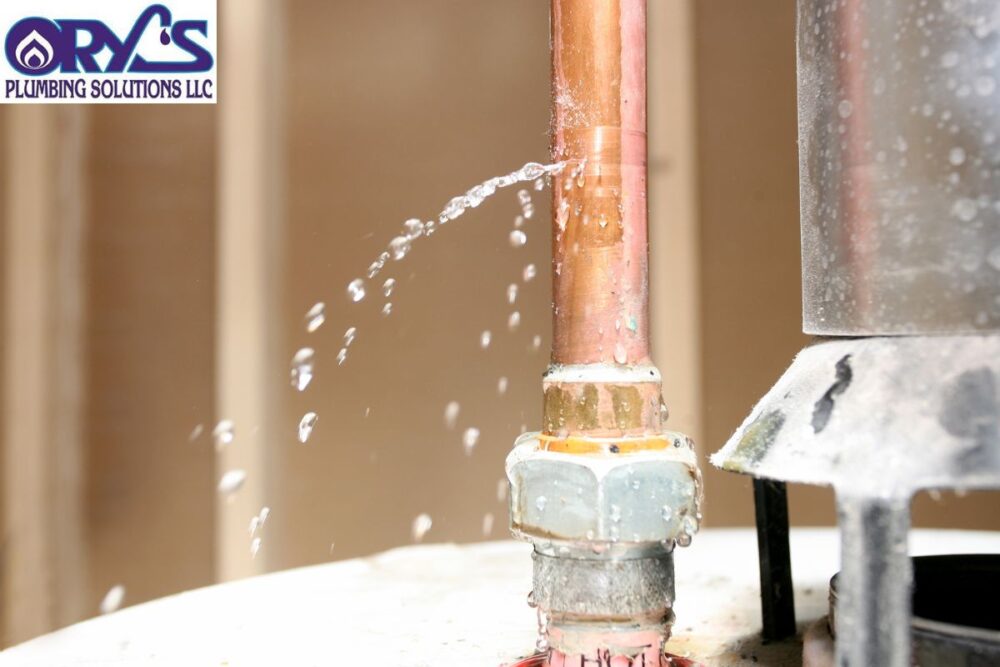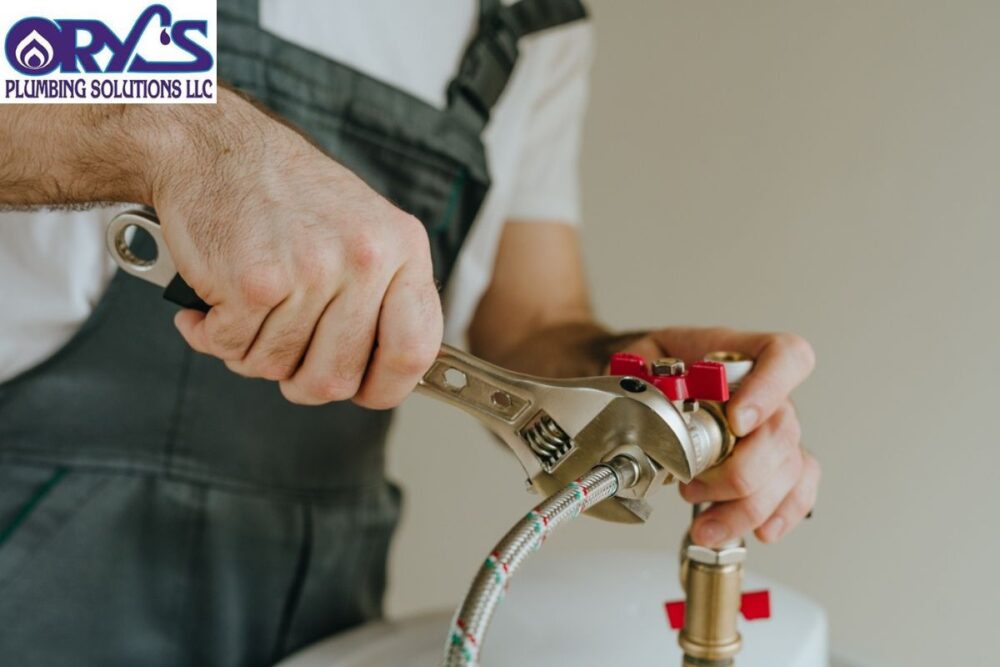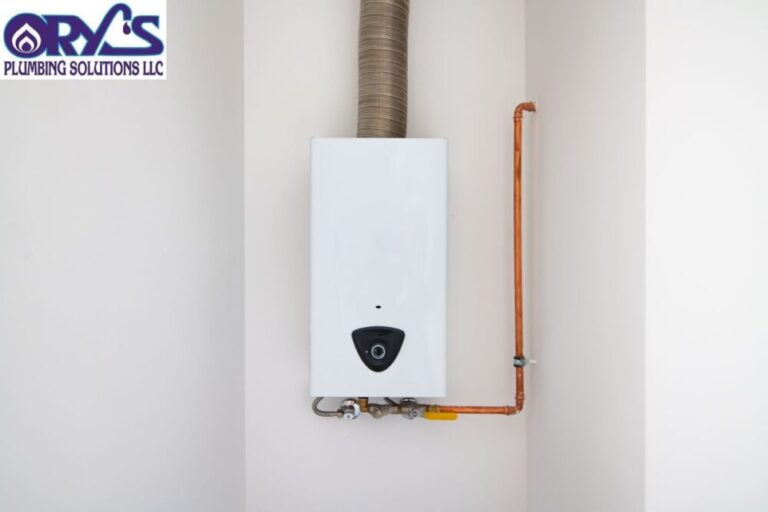What Causes a Water Heater to Leak?
Key Takeaways
- Leaks often stem from corrosion, pressure issues, or loose connections—identifying the exact source is crucial for proper repair or replacement.
- Shutting off water and power immediately can prevent further damage and reduce safety risks when a leak is discovered.
- Minor issues like loose valves can be fixed, but major problems such as tank cracks usually require full water heater replacement.
- Regular maintenance like flushing the tank and checking the anode rod helps prevent leaks and extends the water heater’s lifespan.
A water heater leak means there’s a problem that needs quick attention to prevent further damage to the unit or your home. Leaks can come from several issues, ranging from minor problems that are easy to fix to more serious ones requiring a replacement. It’s crucial to identify the source of the leak to determine whether you can fix it yourself, need a professional, or if the unit needs to be replaced.
Common Reasons for Water Heater Leaks
Water heater leaks can stem from various issues, including age, high pressure, and faulty components.
Aging Tank and Corrosion
As water heaters get older, rust can form inside the tank, causing cracks that lead to leaks. This corrosion can weaken the tank, making leaks more likely. If your water heater is over a decade old, it might be time to replace it. A severely corroded or cracked tank usually means the entire unit needs to be replaced, as repairs are often not possible for such damage.
Issues with Pressure and Valves
High pressure within the water heater can force water out through cracks, causing leaks. This can happen if the water temperature is set too high, leading to water expansion, or if the pressure valves are malfunctioning or loose. The temperature and pressure relief (T&P) valve is a safety device designed to release excess pressure and steam from the tank. If this valve is faulty, improperly installed, or the pressure is too high, it can start to leak. A leaking T&P valve might also indicate that your home’s water pressure is too high or that an expansion tank is needed.
Loose Connections and Faulty Parts
Loose connections at the top of the tank, where cold water enters and hot water exits, can cause leaks. These connections can loosen over time due to normal use. Tightening these connections often solves the problem. The drain valve, located at the bottom of the heater and used for draining and cleaning, can also loosen or corrode over time, leading to leaks. While tightening the valve might fix a minor leak, sometimes the valve needs to be replaced.
Sediment and Anode Rod Problems
Mineral and sediment buildup at the bottom of the tank can cause cracks and reduce efficiency. This buildup can make the water heater work harder, leading to overheating and tank damage. The anode rod helps protect the tank from corrosion by attracting corrosive materials. If the anode rod corrodes too much, the tank becomes vulnerable to cracks and leaks. Replacing a worn-out anode rod can extend the life of your water heater.

What to Do When Your Water Heater Leaks
If you notice your water heater is leaking, taking immediate action can prevent further damage and ensure safety.
Shutting Off Supplies
The first crucial steps are to turn off the water and power supply to the water heater. For a gas water heater, turn off the gas supply line to the unit. For an electric water heater, turn off the corresponding breaker on your electrical panel. You should also shut off the cold water supply to the heater using its dedicated valve, and if necessary, turn off your home’s main water supply valve to prevent additional damage.
Locating the Leak Source
Once the supplies are off, try to find where the water is coming from. Leaks from the top often indicate issues with the cold water inlet or hot water exit pipes, or loose connections. Leaks from the side typically point to the temperature and pressure relief valve. Water leaking from the bottom is usually due to the drain valve or a crack in the tank itself. If you can’t find another cause, a leak from the tank itself, especially a major one, means the water heater needs to be replaced.
When to Call a Professional
While some minor issues like loose connections or a faulty drain valve can be fixed by a homeowner, others require professional help. It’s recommended to call a professional for gas heaters, severe leaks, issues with the tank itself, or when a full replacement is needed. Working with water heaters can be dangerous due to the risk of burns and electrical shock, especially for inexperienced individuals.
Preventing Water Heater Leaks
Regular maintenance is key to extending the life of your water heater and preventing leaks.
Routine Inspections and Flushing
Regularly check your water heater for signs of leaks, rust, or corrosion. It’s advised to visually inspect your water heater every two to three months and have a professional inspection annually. Flushing the tank at least once a year helps remove sediment buildup, which can cause corrosion and reduce efficiency.
Component Checks and Replacements
Test the temperature and pressure relief (T&P) valve periodically to ensure it’s working correctly. You should also check and replace the anode rod every three to five years, as it’s crucial for preventing tank corrosion. Ensure that all connections and valves are tight to prevent leaks. Setting the water heater thermostat to around 120°F can help prevent excessive pressure buildup and reduce pipe corrosion.
Knowing When to Replace
Traditional water heaters typically last 10–12 years, while heat pump water heaters can last 13–15 years. Consider replacing your water heater after 8–10 years to avoid frequent repairs and potential leaks, especially if the tank itself is compromised. A new water heater can offer improved safety features and better energy efficiency.
Conclusion
Understanding the common causes of water heater leaks, from aging tanks and pressure issues to loose connections and sediment buildup, is crucial for addressing problems quickly. While some minor leaks can be fixed by tightening connections or replacing small parts, major issues like a cracked tank often require professional help or a full replacement. Regular maintenance, including flushing the tank and checking components, can significantly extend the life of your water heater and prevent costly repairs.
Prompt action, such as shutting off the water and power supply, is essential when a leak occurs to minimize damage. If you’re unsure about the source of a leak or feel uncomfortable performing the repair, always call a qualified professional. By taking preventive measures and acting quickly when a problem arises, you can keep your water heater running smoothly and protect your home from water damage.
FAQs
How do I know if my water heater is leaking from the tank or a connection?
If the water is coming from the very bottom of the heater and not from a visible pipe or valve, it’s likely a tank leak. Leaks from the top usually mean a problem with the water inlet or outlet pipes, or connections. Leaks from the side often point to the temperature and pressure relief (T&P) valve or another component on the side of the tank.
Can I fix a water heater leak myself?
It depends on the source of the leak. Minor leaks from loose connections or a faulty drain valve might be fixable if you have some plumbing experience. However, leaks from the tank itself, the T&P valve, or gas lines should always be handled by a professional due to safety risks and the complexity of the repairs.
What is the lifespan of a typical water heater?
Most traditional tank-style water heaters last between 10 to 12 years. Tankless water heaters can last longer, sometimes up to 20 years or more, with proper maintenance. Age is a significant factor in determining if a leak means it’s time for a replacement.
How often should I flush my water heater?
It’s recommended to flush your water heater at least once a year to remove sediment buildup. Sediment can cause the tank to corrode and lead to leaks over time, while also making the unit less efficient.
Is a leaking water heater dangerous?
Yes, a leaking water heater can be dangerous. Besides potential water damage to your home, there’s a risk of electrical shock if it’s an electric water heater, or a gas leak if it’s a gas water heater. High pressure in the tank can also be hazardous if the temperature and pressure relief (T&P) valve isn’t working correctly. Always turn off the power/gas and water supply immediately if you notice a leak.
Want to Learn More About Water Heater Issues?
Don’t stop here, check out these helpful guides to understand your water heater better, avoid future problems, and make smarter repair or replacement decisions:
Explore:
Common Problem of Water Heater
How Long Does a Hot Water Heater Last
What Size Tankless Water Heater Do I Need
What Are the Signs of a Failing Water Heater
How Long Does a Water Heater Take to Heat Up
What Causes a Tankless Water Heater to Stop Working
Should I Repair or Replace My Water Heater
What Causes Gas Water Heater to Stop Working
What Causes an Electric Hot Water Heater to Stop Working
Whether you’re trying to fix a leak or just stay ahead of problems, these blogs have you covered.



